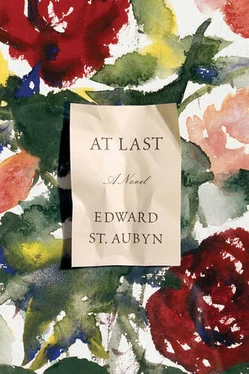When the Crash came, lawyers flew in from America to ask the Craigs to rack their brains for something they could do without. They thought and thought. They obviously couldn’t sell Sunninghill Park. They had to go on entertaining their friends. It would be too cruel and too inconvenient to sack any of the servants. They couldn’t do without the house in Bruton Street for overnight stays in London. They needed two Rolls-Royces and two chauffeurs because Daddy was incorrigibly punctual and Mummy was incorrigibly late. In the end they sacrificed one of the six newspapers that each guest received with their breakfast. The lawyers relented. The pools of Jonson money were too deep to pretend there was a crisis; they were not stock-market speculators, they were industrialists and owners of great blocks of urban America. People would always need hardened fats and dry-cleaning fluids and somewhere to live.
Even if Daddy had been too extravagant, Mummy’s marriage to Jean was a folly that could be explained only by the resulting title — she was definitely jealous of Aunt Gerty being married to a grand duke. Jean’s role in the Jonson story was to disgrace himself, as a liar and a thief, a lecherous stepfather and a tyrannical husband. While Mummy lay dying of cancer, Jean threw one of his tantrums, screaming that doubt was being cast on his honour by her will. She was leaving him her houses and paintings and furniture only for his lifetime and then on to her children, as if he couldn’t be trusted to leave them to the children himself. He knew perfectly well that they were Jonson possessions…and on and on; the morphine, the pain, the screaming, the indignant promises. She changed her will and Jean went back on his word and left everything to his nephew.
God, how Nancy loathed Jean! He had died almost forty years ago, but she wanted to kill him every day. He had stolen everything and ruined her life. Sunninghill, the Pavillon, the Palazzo Arichele, all lost. She even regretted the loss of some of the Jonson houses she would never have inherited, not unless lots of people had died, that is, which would have been a tragedy, except that at least she would have known how to live in them properly, which was more than could be said of some people she could name.
‘All the lovely things, all the lovely houses,’ said Nancy, ‘where have they all gone?’
‘Presumably the houses are where they’ve always been,’ said Nicholas, ‘but they’re being lived in by people who can afford them.’
‘But that’s just it, I should be able to afford them!’
‘Never use a conditional tense when it comes to money.’
Really, Nicholas was being impossible. She certainly wasn’t going to tell him about her book. Ernest Hemingway had told Daddy that he really ought to write a book, because he told such funny stories. When Daddy protested that he couldn’t write, Hemingway sent a tape-recorder. Daddy forgot to plug the thing in, and when the spools didn’t go round, he lost his temper and threw it out of the window. Luckily, the woman it landed on didn’t take any legal action and Daddy had another marvellous story, but the whole incident had made Nancy superstitious about tape-recorders. Maybe she should hire a ghost writer. Exorcized by a ghost! That would be original. Still, she had to give the poor ghost an idea of how she wanted it done. It could be theme by theme, or decade by decade, but that seemed to her a stuffy egghead bookworm kind of approach. She wanted it done sister by sister; after all, the rivalry between them was quite the dynamic force.
Gerty, the youngest and most beautiful of the three Jonson Sisters, was definitely the one Mummy was most competitive with. She married the Grand Duke Vladimir, nephew of the last Tsar of Russia. ‘Uncle Vlad’, as Nancy called him, had helped to assassinate Rasputin, lending his Imperial revolver to Prince Yussopov for what was supposed to be the final kill, but turned out to be only the middle stage between poisoning the energetic priest with arsenic and drowning him in the Neva. Despite many pleas, the Tsar exiled Vladimir for his part in the assassination, making him miss the Russian Revolution and the chance to get bayoneted, strangled or shot by Russia’s new Bolshevik masters. Once in exile, Uncle Vlad went on to assassinate himself by drinking twenty-three dry martinis before lunch every day. Thanks to the Russian whimsy of smashing a glass after drinking from it, there was hardly a moment’s silence in the house. Nancy had Daddy’s copy of a forgotten memoir by Uncle Vlad’s sister, the Grand Duchess Anna. It was inscribed in purple ink to ‘my dear brother-in-law’, although he was in fact her brother’s sister-in-law’s husband. The inscription seemed to Nancy somehow typical of the generous inclusiveness that had enabled that amazing family to straddle two continents, from Kiev to Vladivostok. Before Uncle Vlad’s marriage to Gerty in Biarritz, his sister had to perform the blessing that would traditionally have been performed by their parents. It was a moment they dreaded because it reminded them of the horrifying reason for the absence of their family. The grand duchess described her feelings in The Palace of Memory :
Through the window I could see the great waves pounding the rocks; the sun had gone down. The grey ocean at that moment looked to me as ruthless and indifferent as fate, and infinitely lonely.
Gerty decided to convert to the Russian Orthodox religion, in order to be closer to Vladimir’s people. Anna went on:
Our cousin, the Duke of Leuchtenberg, and I were her sponsors. The ceremony was a long and wearisome one, and I felt sorry for Gerty, who did not understand a word of it.
If her pet ghost could write as well as that, Nancy felt sure she would have a bestseller on her hands. The eldest Jonson Sister was the richest of all: bossy, practical Aunt Edith. While her flighty younger sisters jumped into the pages of an illustrated history book, holding hands with the remnants of some of the world’s greatest families, sensible Aunt Edith, who preferred her antiques to arrive in a crate, made a consolidating marriage to a man whose father, like her own, had been on the list of the hundred richest men in America in 1900. Nancy spent the first two years of the war living with Edith, while Mummy tried to get some of her really valuable things into storage in Switzerland before joining her daughters in America. Edith’s husband, Uncle Bill, struck an original note by paying with his own money for the presents he gave his wife. One birthday present was a white clapboard house with dark green shutters and two gently curved wings, on a slope of lawn above a lake, at the centre of a ten-thousand-acre plantation. She loved it. That was the sort of useful tip that they never gave you in books called The Art of Giving .
Patrick glanced at his unhappy aunt, still complaining to Nicholas by the entrance. He couldn’t help thinking of the favourite dictum of the moderator from his Depression Group, ‘Resentment is drinking the poison, and hoping that someone else will die’. All the patients had impersonated this sentence in more or less convincing Scottish accents at least once a day.
If he was now standing beside his mother’s coffin with uneasy detachment, it was not because he had cherished his aunt’s ‘golden address book’. As far as Patrick was concerned, the past was a corpse waiting to be cremated, and although his wish was about to be granted in the most literal fashion, in a furnace only a few yards from where he was standing, another kind of fire was needed to incinerate the attitudes which haunted Nancy; the psychological impact of inherited wealth, the raging desire to get rid of it and the raging desire to hang on to it; the demoralizing effect of already having what almost everyone else was sacrificing their precious lives to acquire; the more or less secret superiority and the more or less secret shame of being rich, generating their characteristic disguises: the philanthropy solution, the alcoholic solution, the mask of eccentricity, the search for salvation in perfect taste; the defeated, the idle, and the frivolous, and their opponents, the standard-bearers, all living in a world that the dense glitter of alternatives made it hard for love and work to penetrate. If these values were in themselves sterile, they looked all the more ridiculous after two generations of disinheritance. Patrick wanted to distance himself from what he thought of as his aunt’s virulent irrelevance, and yet there was a fascination with status running down the maternal line of his family that he had to understand.
Читать дальше












